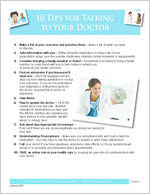10 Tips for Talking to Your Doctor
1) Make a list of your concerns and prioritize them Make a list of what you want to discuss.
2) Take information with you Either bring the medication or bring a list of your prescription drugs, over-the-counter medicines, vitamins, herbal remedies or supplements.
3) Consider bringing a family member or friend Sometimes it is helpful to bring a family member or close friend with you to take notes or remind you of some of your health concerns.
4) Find an interpreter if you know you'll need one Don't let language barriers stop you from asking questions or voicing your concerns. If you do not understand your diagnosis or instructions given by the doctor, express that to doctor or interpreter.
5) Take Notes 6) Plan to update the doctor Fill in the
blanks since your last visit. Mention changes in medications you take and the effects; mention any changes you have noticed in your appetite, weight, sleep, or energy level. 7) Ask about Age Appropriate Screenings Find out if there are any screenings/tests you should be having for your age. 8) Understanding Prescriptions Make sure you understand why and how to take the medication. You may have to ask the doctor to explain or write down instructions. 9) Call your doctor if you have questions, experience side effects, or if your symptoms get worse or to schedule recommended future appointments. 10) TAKE an active role in your health care by keeping an open line of communication with your doctor.
2 Peachtree Street, Atlanta, Ga 30303 w www.dch.georgia.gov January 2011
